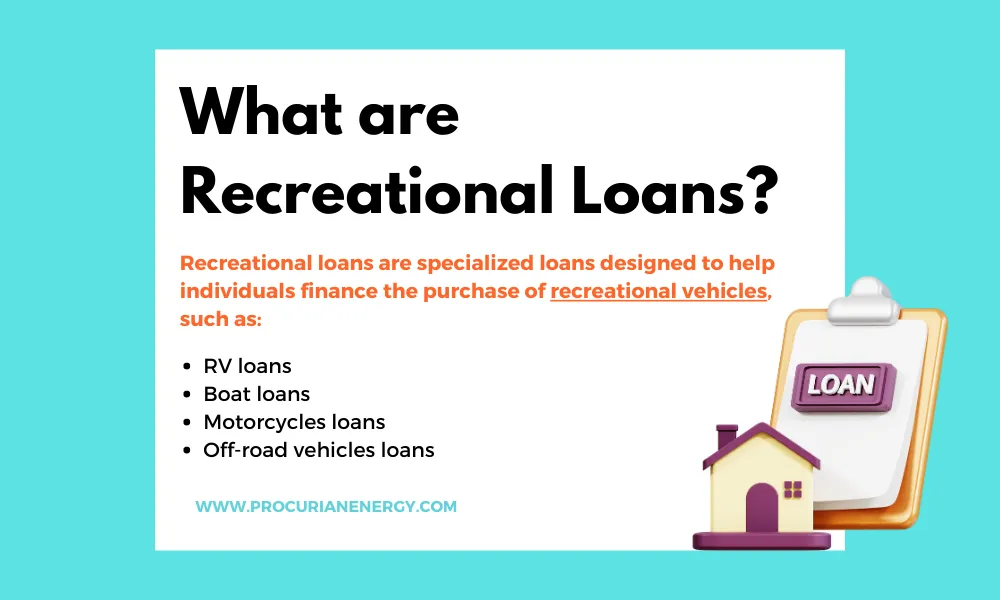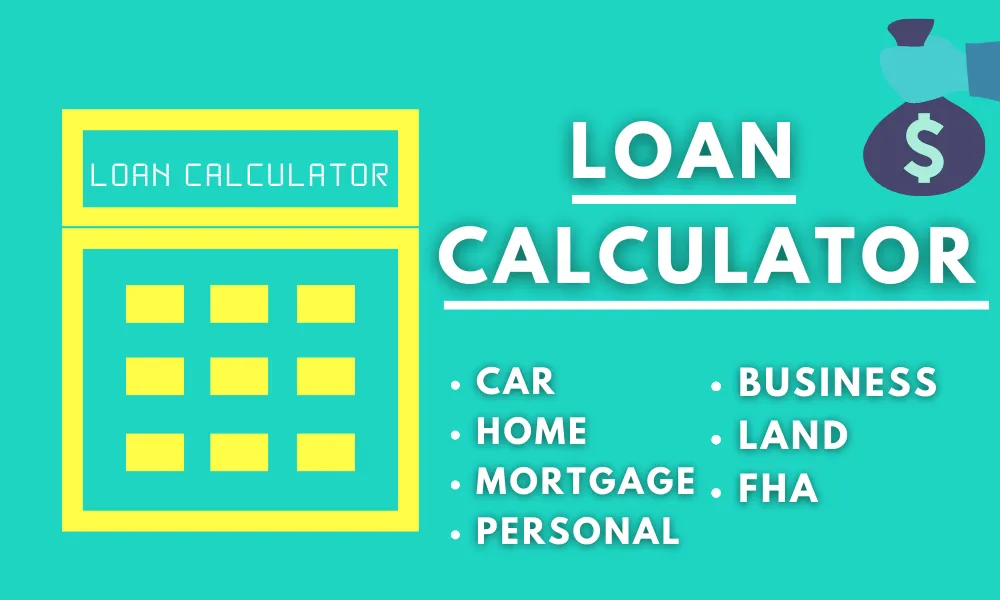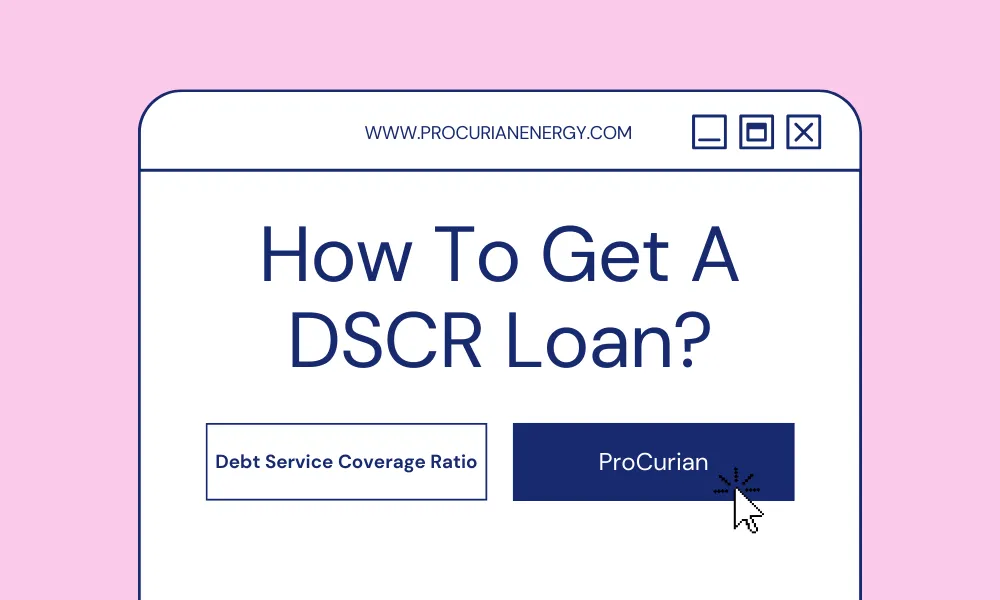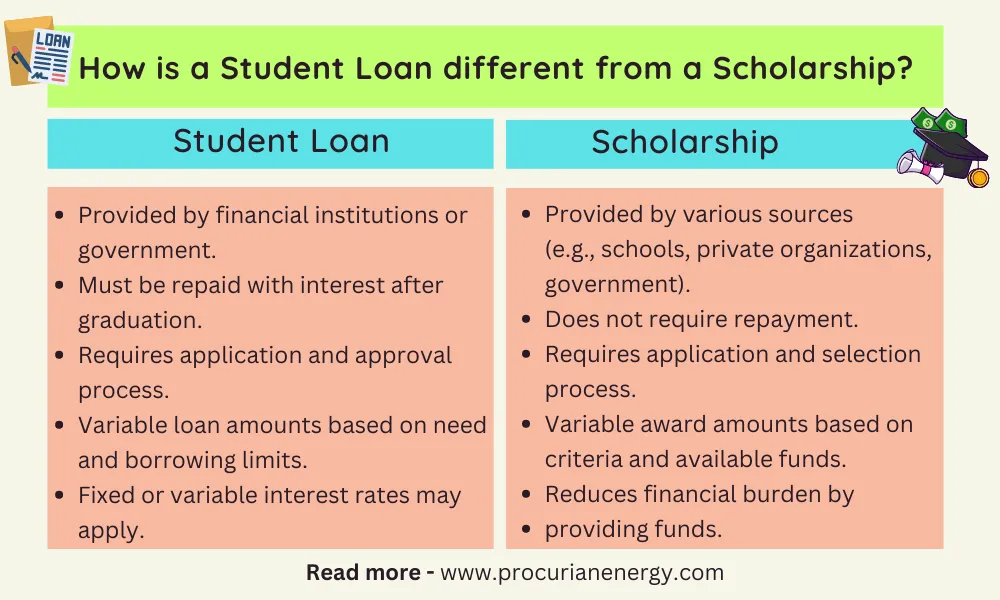Recreational activities provide us with much-needed relaxation & enjoyment and owning a recreational vehicle (RV) or a boat can enhance those experiences.
But these expensive loans sometime have a high price tag.
That’s where recreational loans come in.
This blog post by ProCurian will provide you in-depth explanations of recreational loans‘ terms, conditions and rates.
We’ll also provide you access to a Recreational Loan payment loan calculator so you can figure out your installments more easily.
What are Recreational Loans?

Recreational loan is specialized loan designed to help individuals finance the purchase of recreational vehicles, such as:
- RV loans,
- boat loans,
- motorcycles loans and
- off-road vehicles loans.
They provide individuals with the means to afford high-value items that they may not be able to pay for in a lump sum.
These loans are tailored to the specific needs and requirements of each recreational category.
Recreational Loans are typically secured by the vehicle itself and can offer competitive interest rates and flexible repayment terms.
Recreational Loan rates
Several factors impact the interest rates you can expect for a recreational loan.
The first significant factor is your credit score. Lenders use credit scores to assess your creditworthiness and a higher credit score can result in lower interest rates.
The loan term also plays a role, with longer terms generally leading to higher interest rates.
Additionally, the down payment you can make and the collateral you provide can affect the loan rates.
| Recreational Loan Type | APR Range | Loan Duration | Loan Amount Range | FICO Score Requirement |
|---|---|---|---|---|
| Motorcycle Loan | 3.25% – 7.50% | 36 – 72 months | $5,000 – $30,000 | 650+ |
| RV Loan | 4.50% – 8.75% | 60 – 180 months | $10,000 – $100,000 | 680+ |
| Boat Loan | 3.75% – 8.25% | 36 – 120 months | $10,000 – $150,000 | 700+ |
| Jet Ski Loan | 4.00% – 7.75% | 36 – 84 months | $3,000 – $20,000 | 650+ |
| ATV Loan | 5.00% – 9.00% | 24 – 60 months | $2,000 – $15,000 | 600+ |
| Snowmobile Loan | 4.25% – 8.50% | 24 – 72 months | $3,000 – $25,000 | 650+ |
Terms & Conditions of Recreational Loans
Recreational loans come with specific terms and conditions that borrowers need to understand before signing the loan agreement.
These include:
- Loan amounts, which depend on the cost of the recreational vehicle and your financial situation
- Repayment periods that can range from a few years to over a decade.
- Interest rates are crucial and can be fixed or variable.
- Annual Percentage Rate (APR) encompassing additional fees and charges.
Eligibility and Requirements for Recreational Loans
For loans used for recreational purposes, various lenders may have varying policies and qualifying requirements.
1) Credit Score – Lenders routinely review your credit score and credit history to assess your creditworthiness. A better credit score often increases your chances of obtaining a loan approved, which may also lead to more advantageous terms. A credit score above 700 is considered to be a good one.
2) Debt-to-Income Ratio and Income – To ensure you have the means to repay the loan, lenders frequently request evidence of income. They could also consider your debt-to-income ratio which is the percentage of your monthly income that you devote to paying off debt.
4) Age and residency requirements – You must be at least 18 years old and a citizen of the nation where you are requesting the loan. Some lenders may have specific age requirements such as a minimum age of 21 or 25.
5) Down payment – You could need to put down money for the recreational vehicle, depending on the lender and the size of the loan. A bigger down payment may result in better loan conditions because the down payment amount is often a proportion of the entire purchase price.
6) Documentation – Lenders typically require various documents to verify your identity, income, and financial stability. These may include:
- government-issued identification,
- pay stubs,
- tax returns,
- bank statements and
- proof of assets.
7) Insurance – Lenders may require you to provide proof of insurance for the recreational vehicle. This is to protect their investment in case of damage, theft or accidents.
Recreational Loan Payment Calculator
Loan Details:
Recreational Loan Application Process
When applying for a recreational loan, it’s essential to research different lenders and compare loan options to find the best fit for your needs.
Once you’ve chosen a lender, gather the necessary documents such as income statements and identification, to support your application.
The approval process typically involves a credit check and once approved, the funds are disbursed.
Then, you can finalize the purchase of your recreational vehicle.
Advantages & Disadvantages for Recreational Loan
| Advantages | Disadvantages |
|---|---|
| 1. Access to funds – A recreational loan allows you to access the funds needed to purchase recreational vehicles such as boats, RVs or motorcycles, which might otherwise be difficult to afford upfront. | 1. Interest rates – Recreational loans often come with higher interest rates compared to other types of loans, making them potentially more expensive in the long run. |
| 2. Flexible repayment terms – Many lenders offer flexible repayment terms for recreational loans, allowing you to choose a repayment schedule that suits your financial situation. | 2. Depreciation – Recreational vehicles tend to depreciate in value over time, which means you may owe more on the loan than the vehicle is worth if you decide to sell it before fully paying off the loan. |
| 3. Ownership benefits – With a recreational loan, you become the owner of the recreational vehicle, giving you the freedom to use and enjoy it as you please. | 3. Potential financial strain – Taking on a recreational loan adds a financial obligation that can strain your budget and affect your overall financial well-being. |
| 4. Tax benefits – In some cases, the interest paid on a recreational loan may be tax-deductible, providing potential tax benefits. | 4. Insurance costs – Recreational vehicles often require specialized insurance coverage, which can be more expensive than regular auto insurance, adding to the overall cost of ownership. |
| 5. Enhance quality of life – Owning a recreational vehicle can provide opportunities for travel, exploration and leisure activities, enhancing your overall quality of life. | 5. Risk of repossession – If you fail to make timely loan payments, there is a risk of repossession of the recreational vehicle, potentially leading to a negative impact on your credit score and loss of the vehicle. |
Alternatives to Recreational Loans
Recreational loans might not be the best option for everyone. Consider these alternatives:
1) Saving and Budgeting – Save money over time to purchase the recreational item outright, reducing the need for financing.
2) Other Financing Options – Explore personal loans or credit cards as alternatives, depending on the interest rates and terms available.
3) Renting or Leasing – Consider renting or leasing a recreational item instead of owning it, which may be a cost-effective alternative for occasional use.
FAQs related to Recreational Loans
What credit score do you need for a recreational loan?
Credit score requirements for recreational loans vary among lenders but generally, a good credit score of 670 or higher is recommended to qualify for favorable terms and rates.
What is the debt-to-income ratio for a recreational loan?
Debt-to-income ratio is generally recommended to keep it below 45% to qualify for a recreational loan.
Is an RV loan considered a mortgage?
No, RV loan is not considered a mortgage. It is a loan specifically designed for financing the purchase of a recreational vehicle.
Which FICO score is used for RV loans?
The RV financing industry-standard ranges from about 660 to 700 FICO score.
Is getting into a RV loan the same as a car loan?
No, getting an RV loan is not the same as a car loan. RV loans are specifically designed for financing recreational vehicles.
Can you pay off an RV loan early?
Yes, it is typically possible to pay off an RV loan early. However, specific terms and conditions may vary depending on the lender.
What is the difference between a car loan and an RV loan?
A car loan is used to finance a car purchase, while an RV loan is specifically designed for purchasing recreational vehicles such as motorhomes or campers.
How do people afford RVs?
People afford RVs through various means, including saving money, taking out loans, selling assets, budgeting or utilizing financing options offered by dealerships.
Conclusion
Recreational loans offer individuals the opportunity to pursue their leisure activities and enjoy the ownership of high-value recreational items.
However, it’s crucial to approach these loans with careful consideration and responsible borrowing practices.
By evaluating your financial situation, researching loan options and understanding the risks involved, you can make an informed decision that aligns with your long-term financial goals.
Remember, financial planning and responsible borrowing will help ensure your leisure pursuits are enjoyable and sustainable in the long run.









